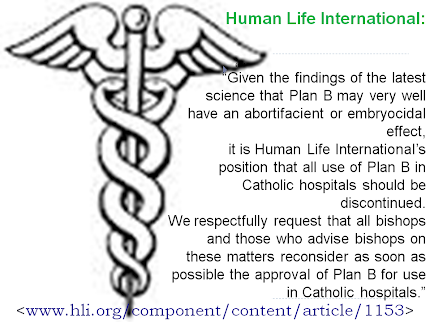In 2009, the U.S. Bishops issued Ethical and Religious Directives for Catholic Health Care Servies (5th edition). With reasoning based on natural law and confirmed by the teaching of the Church, the ERDs summarize the Church's guidance to Catholic health care providers (as well as to Catholics engaged in health care in non-Catholic settings, Catholic consumers of health care, and to all people of good will). After a preamble and general intro and before a conclusion, the ERDs consist of sections devoted to
- "The Social Responsibility of Catholic Health Care Services"
- "The Pastoral and Spiritual Responsibility of Catholic Health Care"
- "The Professional-Patient Relationship"
- "Issues in Care for the Beginning of Life"
- "Issues in Care for the Seriously Ill and Dying"
- "Forming New Partnerships with Health Care Organizations and Providers"
"The Social Responsibility of Catholic Health Care Services" provides a reminder of how Catholic health care is to be animated by an spirit of service, seeing Jesus in each person served - especially the most vulnerable. The ERDs recognize the sanctity of each and every human life from the very first moment of fertilization until natural death.
"The Pastoral and Spiritual Responsibility of Catholic Health Care" may seem the most sectarian of the sections. While reminding health care providers of the sacramental needs of Catholic patients, this section is absolutely attentive to the pastoral needs of ALL patients - Catholics and non Catholics, alike.
"The Professional-Patient Relationship" sets a gold standard for respectful treatment of patients and personal autonomy:
- "While every person is obliged to use ordinary means to preserve his or her health, no person should be obliged to submit to a health care procedure that the person has judged, with a free and informed conscience, not to provide a reasonable hope of benefit without imposing excessive risks and burdens on the patient or excessive expense to family or community."
- "The sick person in a vegetative state, awaiting recovery or a natural end, still has the right to basic health care (nutrition, hydration, cleanliness, warmth, etc.), and to the prevention of complications related to his confinement to bed. He also has the right to appropriate rehabilitative care and to be monitored for clinical signs of eventual recovery.
"I should like particularly to underline how the administration of water and food, even when provided by artificial means, always represents a natural means of preserving life, not a medical act. Its use, furthermore, should be considered, in principle, ordinary and proportionate, and as such morally obligatory, insofar as and until it is seen to have attained its proper finality, which in the present case consists in providing nourishment to the patient and alleviation of his suffering" (Address to the International Congress on "Life-Sustaining Treatments and Vegetative State," 3/20/04)
- "A patient in a nursing home or hospital is increasingly likely to be asked to sign a form with a benign-sounding name: Physician’s Order for Life-Sustaining Treatment....the Physician’s Order for Life-Sustaining Treatment (Polst), in an instrument for dealing with end-of-life decisions if the patient is incapacitated....'The Polst is a living will on steroids,' said E. Christian Brugger, who holds the Cardinal Stafford Chair of Moral Theology at St. John Vianney Theological Seminary in Denver and is one of a number of Catholic ethicists concerned about the emergence of the Polst....'The ethical guidelines for Catholic hospitals — called the "Ethical and Religious Directives" — state clearly that the administration of food and water to all patients who need them to survive is a moral obligation,' said Brugger" (National Catholic Register, 5/16/12).
"Issues in Care for the Beginning of Life" and "Issues in Care for the Seriously Ill and Dying" are absolutely consistent with the original wording of the Hippocratic Oath:
- "I will neither give a deadly drug to anybody who asked for it, nor will I make a suggestion to this effect. Similarly I will not give to a woman an abortive remedy."
"Issues in Care for the Beginning of Life" is also consistent with the Vatican's 2008 instruction on human life at its origins, "Dignitas Personae" (The Courier Times published a piece which I did on this, called "Welcome Guideline for Couples: a ‘"Yes" Behind Every "No.”'"). No matter how small and no matter how a new human came to be, she is owed absolute respect and the right to originate in the loving embrace of Mom and Dad, who are married to each other. With regard to reproductive technology, Dignitas Personae says that - when employed by a husband and wife - assistance to AID the "marital act" toward procreation can be moral but that methods REPLACING the marital act (eg., IVF) are immoral.
Exacerbating IVF’s immorality is the discarding or freezing of "extra" embryos. In addition to it being forbidden to use new humans as research material, my reading of Dignitas Personae is that implanting a human embryo - even an abandoned human embryo - in a second woman's womb is prohibited. My reading is that Section 23 calls for a change at Catholic hospitals, regarding treatment of women identified as victims of sexual assault. Dignitas Personae simply does NOT offer guidelines for supposed moral use of substances which are potentially abortifacient.
Dignitas Personae forbids human cloning, as well as the mixing of human and animal genetic material (Pretty hard to believe that “scientists” do this, isn't it?). With regard to gene therapy, "Procedures used on somatic cells for strictly therapeutic purposes are in principle morally licit....in its current state, germ line cell therapy in all its forms is morally illicit” (# 26). Also rejected is “genetic engineering for purposes other than medical treatment” (# 27) and embryonic stem cell research.
The ERDs see organ donations as great gifts to humanity; "Issues in Care for the Seriously Ill and Dying" certainly also encourages individuals to provide for donation of organs which cannot be donated while still alive (e.g., the heart). This requires verification that a person is truly dead, before organs are removed! Dr. Peter Colosi of the Philadelphia's St. Charles Borromeo Seminary has recalled words of the late Pope John Paul II to the International Transplantation Society: “the criterion adopted in more recent times for ascertaining the fact of death, namely the complete and irreversible cessation of all brain activity, if rigorously applied, does not seem to conflict with the essential elements of a sound anthropology.”
Noting the incredible significance of the word “seem” in that sentence, Colosi joins certain members of the Vatican's Pontifical Academy for Life who have cast doubt on how "rigorously applied" those criteria truly are. In fact, Academy member Dr. Paul Byrne, a clinical professor of pediatrics and a past president of the Caholic Medical Association, even dramatically maintains that "every heart to be transplanted is a healthy heart taken from a living person who is killed in the process."
Recognizing financial realities, "Forming New Partnerships with Health Care Organizations and Providers" call for collaboration between Catholic and non-Catholic health care providers "in ways that do not compromise Catholic social and moral teaching." In a 2005 communication, the Vatican's Pontifical Academy for Life elaborated on situations in which collaboration (or "cooperation") could involve well meaning people with practices which the Church recognizes as evil:
- We can certainly NEVER embrace or condone evil actions.
- Even when we clearly reject evil being done by someone else, certain situations can still involve us - perhaps very loosely - in someone else's evil acts (e.g., use of tax dollars for evil purposes).
- When the evil involves an assault on human life and cannot get done without our particular cooperation, the Pontifical Academy for Life tells us that "it is always to be considered illicit."
- The ERDs go on to say that "The possibility of scandal must be considered when applying the principles governing cooperation. Cooperation, which in all other respects is morally licit, may need to be refused because of the scandal that might be caused."
























